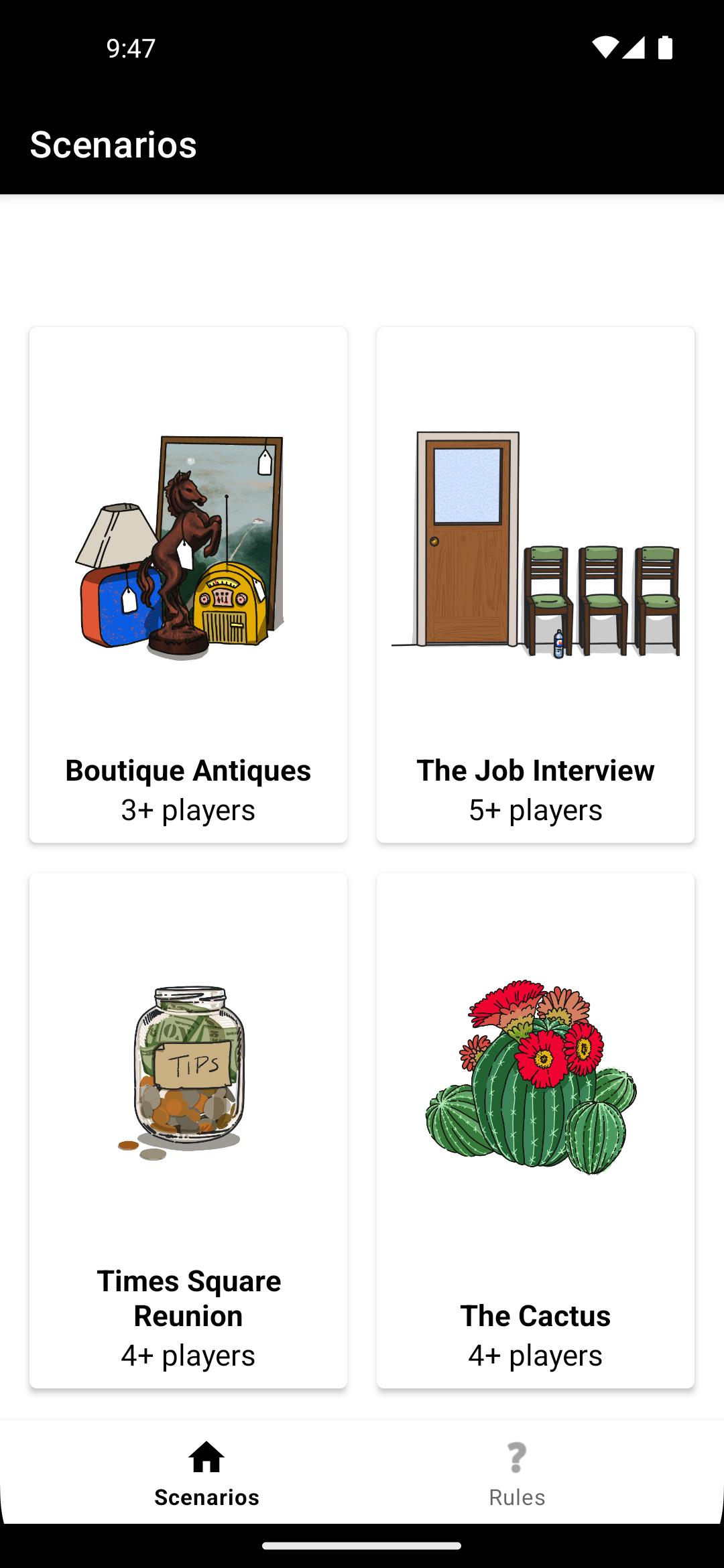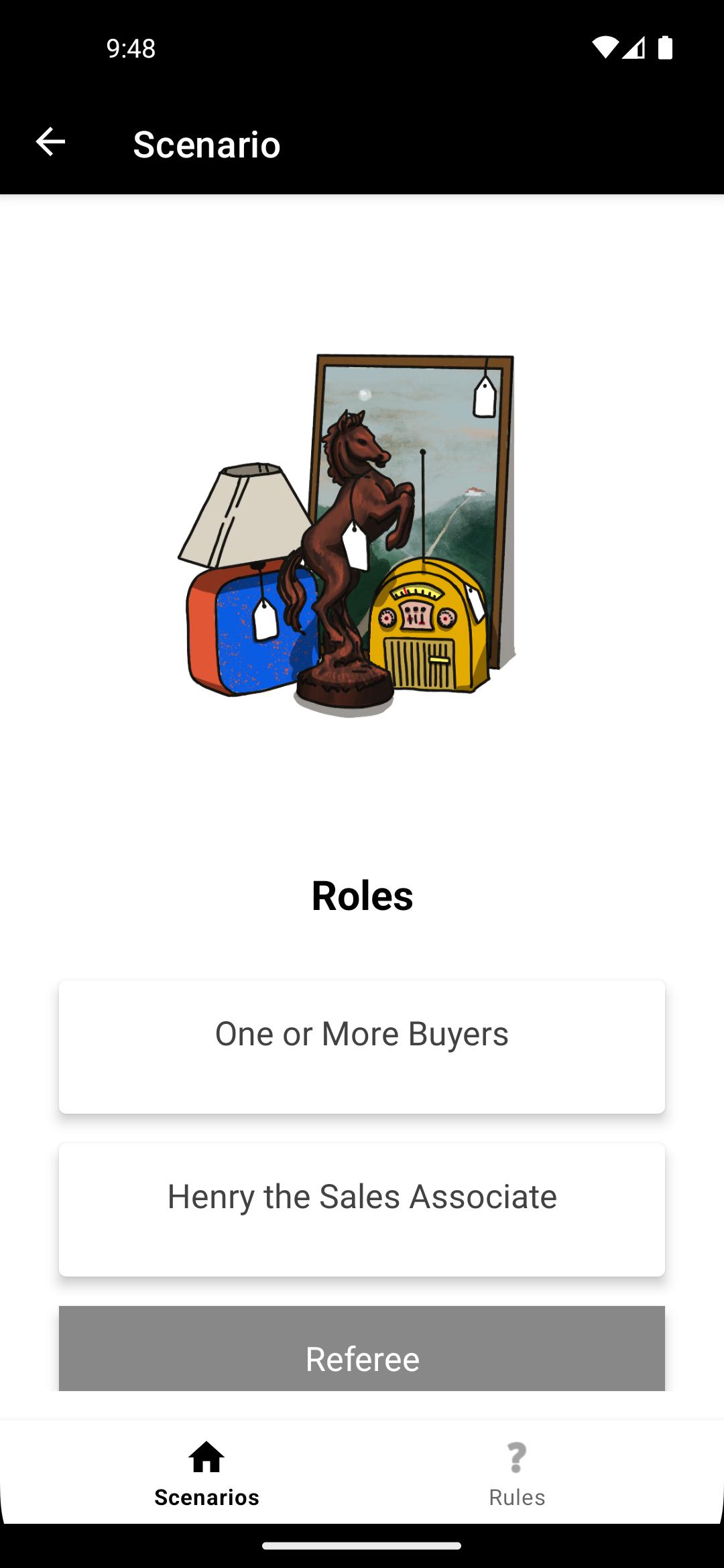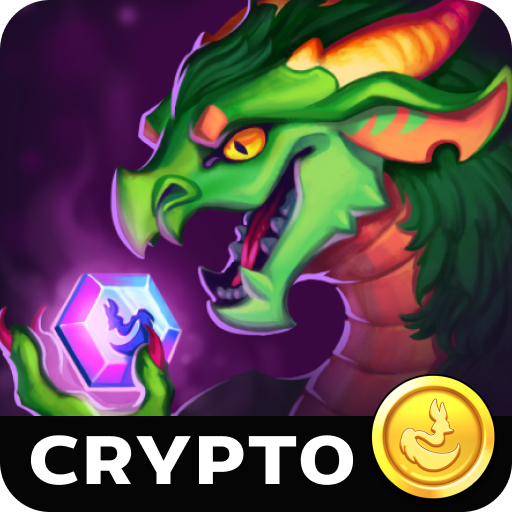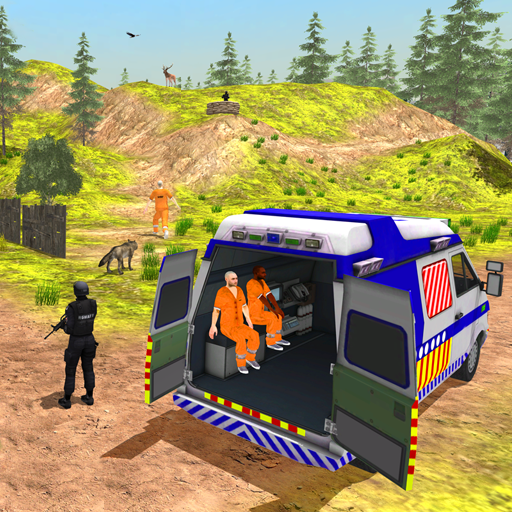
Scenario
Screenshot
Description
Content
Role playing party games for 3+ players. Each scenario takes 5-15 minutes.
In each Scenario, you are a character pursuing a secret goal. To win, you will need to act intelligently within the world of the story.
The gameplay is live and in-person, with movement and drama.
Each Scenario is only playable once.
What's New in the Latest Version New Simplified Format
Last updated on Jun 21, 2024
Improved UI
Scenario, a term used in gaming, encompasses a wide range of meanings depending on the specific context. Generally, a scenario refers to a predefined situation or sequence of events that unfolds within a game. This can range from a short, self-contained encounter to a complex, branching narrative that spans the entire game. Scenarios provide structure and direction, guiding players through a series of challenges and objectives.
In board games, scenarios often represent specific historical battles, fictional conflicts, or unique game setups with special rules and victory conditions. These scenarios offer replayability and variety, allowing players to experience different challenges and strategic possibilities. For example, a wargame scenario might depict a famous historical battle, complete with accurate troop deployments and terrain features. Players then assume the roles of opposing commanders, striving to achieve victory within the constraints of the historical context.
Role-playing games (RPGs) heavily rely on scenarios to drive the narrative and provide structure for gameplay. A scenario in an RPG might involve a dungeon crawl, a political intrigue, or a wilderness exploration. The Game Master (GM) typically presents the scenario to the players, describing the setting, introducing non-player characters (NPCs), and outlining the challenges the players must overcome. Players then make choices and take actions that shape the unfolding narrative, creating a dynamic and interactive storytelling experience.
Video games also utilize scenarios to create engaging gameplay experiences. In strategy games, scenarios can represent historical battles, hypothetical conflicts, or unique challenges with specific objectives. These scenarios test players' strategic thinking and decision-making skills, offering diverse gameplay experiences beyond the main campaign. In other genres, such as adventure games or role-playing games, scenarios can represent specific quests, missions, or story arcs that contribute to the overall narrative.
Scenario design is a crucial aspect of game development. A well-designed scenario should be engaging, challenging, and rewarding. It should provide a clear objective, introduce interesting characters and settings, and offer opportunities for strategic decision-making and player agency. The difficulty of a scenario should be balanced, providing a challenging but achievable experience for the intended audience.
The concept of scenarios extends beyond pre-designed content. Many games offer tools and resources for players to create their own scenarios. This allows for endless possibilities and customization, fostering creativity and community engagement. Players can design scenarios based on their own ideas, historical events, or fictional worlds, sharing them with other players and expanding the game's content.
In competitive gaming, the term "scenario" can also refer to specific in-game situations or strategies. For example, in a fighting game, a scenario might describe a specific combination of moves or a tactical approach to combat. In a real-time strategy game, a scenario might refer to a particular build order or unit composition. Understanding these scenarios can be crucial for competitive players seeking to improve their skills and gain an advantage.
The term "scenario" can also be used more broadly to describe any hypothetical situation or potential outcome within a game. For example, players might discuss different scenarios that could arise during a game, analyzing the potential consequences of different choices and actions. This type of strategic thinking is essential for success in many games, allowing players to anticipate challenges and plan accordingly.
In conclusion, the term "scenario" in gaming encompasses a diverse range of meanings, from pre-designed game content to player-created challenges and hypothetical situations. Scenarios provide structure, direction, and variety to gameplay, enhancing the overall experience and fostering creativity and strategic thinking. Whether it's a historical battle in a wargame, a dungeon crawl in an RPG, or a hypothetical situation in a competitive game, scenarios play a vital role in shaping the world of gaming.
The flexibility and adaptability of the term "scenario" allow it to be applied to a wide range of game genres and contexts. This versatility contributes to the richness and depth of gaming experiences, offering players endless possibilities for exploration, challenge, and creativity.
Ultimately, the meaning of "scenario" depends on the specific game and context in which it is used. However, the underlying principle remains the same: scenarios provide a framework for gameplay, offering structure, direction, and opportunities for engagement and strategic thinking.
Information
Version
Release date
Jun 21 2024
File size
8.2 MB
Category
Role Playing
Requires Android
Android 8.1+
Developer
ท.แท่ง เอิ้นกะหัน คับ ผมบ่ยิ่งดอกคับ
Installs
50+
ID
com.tbg_scenario
Available on

























